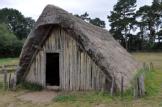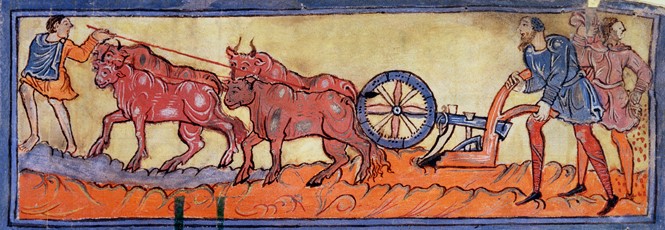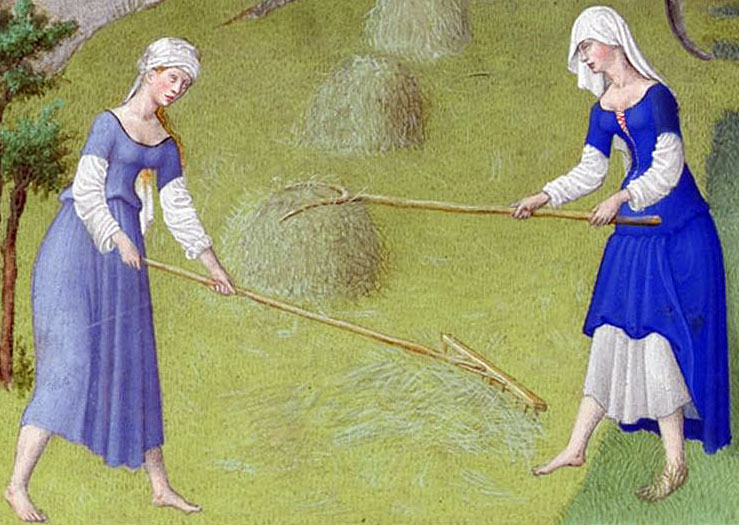Rural society
Seminar and Essay Questions
- Was serfdom primarily an economic institution?
- 'The manor played a central role in the medieval countryside'. Discuss.
- Why did the manorial system begin to break down in the later Middle Ages?
documents
- A dispute over exaction of the corvee, 1081
- Account of Alwaton Manor, 1279 (for a description of feudal dues)
- A Manorial Court: 1246-1249
introductory reading
Power, Central Middle Ages, 28–56.
Bartlett, Making of Europe, 106–66.
Barber, Two Cities, 36–41.
e-resources
- Information about Wharram Percy. This village was destroyed at around the time of the Black Death. Archaeological study of the site gives us an idea of what a medieval village would have looked like.
- Generic plan of a medieval manor: open-field strip farming, some enclosures, triennial crop rotation, demesne and manse, common woodland, pasturage and meadow.
- Laxton: A Medieval Village
- Key to English Place-names
further reading
Bailey, Mark, The English Manor, c.1200-c.1500 (Manchester, 2002)
Bailey, Mark, The Decline of Serfdom in Late Medieval England: From Bondage to Freedom (Suffolk : Boydell & Brewer, 2014)
Balestracci, Duccio, The Renaissance in the Fields: Family Memoirs of a Fifteenth-Century Tuscan Peasant, trans. Paolo Squatriti and Betsy Merideth (University Park, 1999)
Bennett, H.S., The Pastons and their England, 2nd ed. (London, 1968)
Bisson, Thomas N., 'Medieval Lordship', Speculum 70 (1995), 743-59.
Bisson, Thomas N., 'The "Feudal Revolution"', Past and Present 142 (1994), 6-42.
Bloch, Marc, Feudal Society, 2nd ed., 2 vols. (London, 1965)
Brown, Elizabeth, 'The Tyranny of a Construct: Feudalism and Historians of Medieval Europe', American Historical Review 79.4 (1974), 1063-88.
Duby, Georges, The Early Growth of the European Economy: Warriors and Peasants from the Seventh to the Twelfth Century (Ithaca, NY, 1974)
Duby, Georges, The Three Orders: Feudal Society Imagined (Chicago, 1980)
Dyer, Christopherm Peter Coss, and Chris Wickham, eds, Rodney Hilton's Middle Ages : an exploration of historical themes (Oxford, 2007) (Lots of useful articles, esp. relevant: Dyer, Alfonso, Burin, Muller, Schofield)
Freedman, Paul, The Origins of Peasant Servitude in Medieval Catalonia (Cambridge, 1991)
Ganshof, F.L., Feudalism, trans. Philip Grierson (London, 1952)
Hanawalt, Barbara, The Ties that Bound: Peasant Families in Medieval England (Oxford, 1986)
Head, T., and R. Landes (eds), The Peace of God: Social Violence and Religious Response in France Around the Year 1000 (Ithaca, NY, 1992)
Hilton, R.H., Bond Men Made Free (London, 1973)
Hilton, R.H., The English Peasantry in the Late Middle Ages (Oxford, 1975)
Hilton, R.H., Class Conflict and the Crisis of Feudalism (London, 1985)
Kilby, Susan, 'Mapping peasant discontent: trespassing on manorial land in fourteenth-century Walsham-le-Willows' Landscape History (2015), pp.69-88.
Muller, Miriam, 'Peasant Women, Agency and Status in Mid -Thirteenth to Late Fourteenth - Century England: Some Reconsiderations' in: C. Beattie and M. F. Stevens eds., Married Women and the Law in Premodern Northwest Europe (Boydell and Brewer, 2013)
Reynolds, Susan, Fiefs and Vassals (Oxford, 1994)
Reynolds, Susan, Kingdoms and Communities in Western Europe, 900-1300, 2nd ed. (Oxford, 1997)
Rosener, Werner, Peasants in the Middle Ages (Cambridge, 1992)
Schofield, Phillipp, Peasant and Community in Medieval England 1200-1500 (2002)
White, Lynn, Jr., Medieval Technology and Social Change (Oxford, 1966)
Woolgar, C. M., The Great Household in Late Medieval England (New Haven, 1999)




